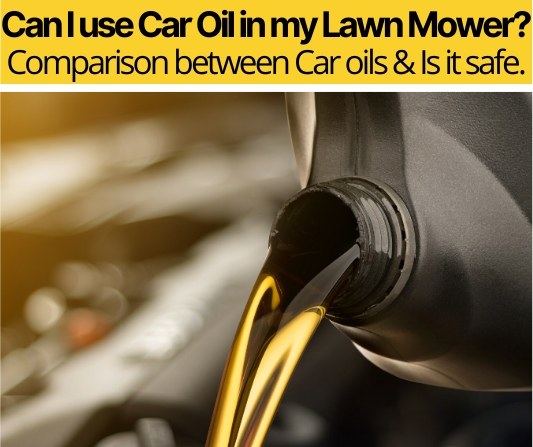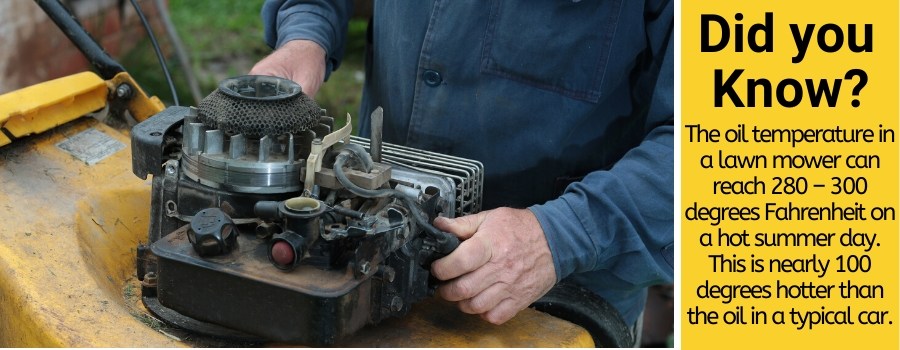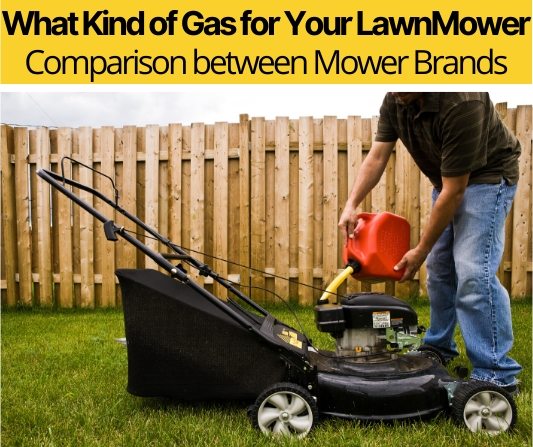 Just like any other engine, lawn mowers require oil to keep their parts lubricated, especially since they tend to run hotter than bigger engines.
Just like any other engine, lawn mowers require oil to keep their parts lubricated, especially since they tend to run hotter than bigger engines.
You might be thinking about using some leftover car oil for your mower to save time and money.
Before you go and do that, it’s important to know what kind of oil you’re putting into your mower, and what factors are around you that might make this a great idea or a not-so-great idea.
Can I Use Car Oil in my Lawn Mower?
You can use certain Car Oils in your lawn mower, however this will Depend on exactly the type of car oil you plan to use , your climate, how frequently you use your mower & how hard it works. Generally, you should be able to use 10w40 car oil in your mower and even 10w30 oil if you don’t live somewhere cold.
While both small engine oil and car oil are derived from crude oil, they have additives that differentiate them from each other, which could render one kind of car oil a perfect substitute for mower oil and another something to steer clear of. In this article, we will cover the most common types of car oil grades & If they are suitable for your mower.
Is car oil the same as lawn mower oil?
Almost, but not quite. Small engine oil is usually single grade because small engines run much hotter and thus need the oil to remain thick to keep the engine lubricated. Thus, a lot of small engine oil will labelled SAE 30 or 40. Most car engine oil nowadays is multi-grade, since not only do big engines not run as hot as small engines, but cars are more often exposed to fluctuating weather than small engines, being left out in the snow or baking in the sun. Thus, car motor oil is often labeled with a formula like 10w30 or 15w40.
To understand the difference between car oil and lawn mower oil and what the different designations mean, we’ll have to look into what “viscosity” means. Essentially, it means thickness. The Society of Automotive Engineers (SAE) assigns engine oil a certain viscosity grade based on how thick the oil is, ranging from 0W-60, 0W being the absolute thinnest and 60 being the absolute thickest.
While oil thickness might seem arbitrary, it’s very important depending on the type of engine you have and the kind of place you live. Thinner oils are more beneficial for newer engines and for those in colder climates, as oil can turn gelatinous if it gets too cold, making cold starts difficult. Thicker oil is better for older engines and those in warmer climates, as oil can thin out if it gets too hot, leading to inadequate lubrication. This is also why thick oil is recommended for those engines that work especially hard.
Along with viscosity, two different kinds of motor oil exist, single grade and multi-grade. Single grade oil is the same viscosity at all temperatures, so oil that says SAE 30 would have a viscosity rating, or weight, of 30 no matter how hot or cold the temperature is. Meanwhile, multi-grade oils such as 5w30 or 10w40 have been treated with viscosity index improvers, so, depending on the temperature, the oil thickens or thins to keep vehicles in variant temperatures running healthily.
For reference, the “w” sign in the viscosity grade means “winter,” with the number on the left showing the viscosity of the oil when exposed to 0℉. So 5w oil is thinner at low temperatures than 10w oil, meaning 5w will start your car better in freezing weather. The number on the right shows the viscosity of the oil at operating temperature, 100℃. So, oils such as 5w30 and 10w30 share the same viscosity at operating temperature, but the former oil runs thinner in cold temperatures.

What happens if you put car oil in your lawn mower?
It depends on what kind you put in your mower. There are a few multi-grade oils that should run just fine in your mower, but some of them might be too thick or too thin. Oil that’s too thin could fail to lubricate your mower engine, causing it to run too hot and have engine parts grind against each other, causing wear over time. Meanwhile, oil that’s too thick could create a buildup of motor sludge and gum up the crankshaft, making it much harder to start and dirty the engine over time.
Also read: What Kind of Gas For your LawnMower
Which multi-grade oils are safe to use in my lawn mower?
Here are a few multi-grade oils and whether or not you should use them in your lawn mower. We’ll also compare them to the most common lawn mower oil grade, SAE 30, since most small engines require a minimum oil weight of 30.
5w20
This is thinner oil designed more for newer cars, cold climates, and for better fuel economy. Generally, I don’t recommend this one for lawn mowers since it runs a bit too thin. The maximum viscosity it can reach is 20, too thin for most small engines. Thin oil could inadequately lubricate the engine’s parts, leading to overheating or engine wear. I might only recommend this in very chilly temperatures, but most grass is dead or buried in snow by then. However, this does make 5w20 oil great for snowblowers.
5w30
This is a slightly thicker oil designed for slightly older cars or those in cold to cool climates. Popular in most passenger cars. This oil is more useable in lawn mowers than 5w20, since it reaches the ideal weight of 30 at operating temperature, but keep in mind it can still become too thin if especially hot or especially cold. Check your manual first.
10w30
About the same as 5w30 oil, but more universal, ideal for middle-aged cars and for cool to warm temperate climates. Quite useable in lawn mowers, since it stays about the right thickness when at operating temperature, but always be sure to check your owner’s manual first. If you live somewhere cold you might want to reconsider.
10w40
About the same as 10w30, but often recommended for use in places with hot summers or to prevent wear in older engines. Useable in lawn mowers, but always be sure to check your owner’s manual first, as a weight of 40 might be too sticky for a mower engine unless you are working somewhere with intense summers or using a machine that runs very hot.
10w50
This is motor oil that’s often used for motorcycle engines. It runs especially thick since bike engines are closer to hot asphalt and can overheat easier than car engines. 50 weight might be too thick for most mowers, but in very hot places it could work just fine, especially if your mower engine is a little older and is seeing a lot of use, like if you are mowing a big commercial property or several lawns a day for your landscaping business.
15w40
Thicker oil often used for tractors, trucks, and passenger cars, especially those that run on diesel. Might be too thick for some mowers, but a lot like 10w40 and 10w50, this oil can work very well in high heat conditions or for mowers that are used often, especially for big jobs like commercial lots.
20w50
High-performance oil often used in hard working engines such as towing vehicles or racecars. Very thick and not recommended for the average lawn mower. It can cause a build-up of sludge or difficulties starting in mowers that aren’t super heavy duty or being used often for big commercial jobs, so try to aim a little lower unless you’re absolutely sure.
Can I put synthetic oil in my mower?
Yes, you can. Briggs and Stratton boasts on their website that they have modified their engines to accept synthetic oil, and most newer lawn mowers will accept synthetic oil as well. Just keep in mind that it might be pricier down the line. Andrew T from the blog Lawn EQ says that synthetic oil tends to burn off a lot faster than conventional oil, and costs a good deal more than conventional oil (a difference of about $20), so it might be less pricey to stick with conventional oil. If you’ve got the money for it, by all means use the type of oil you think is right.
Which is better overall for a lawnmower, 10w30 or 10w40?
I hate to sound like a broken record, but it all depends on your mower and your climate. The most common small engine oil out there is SAE 30, which makes 10w30 seem like the obvious pick. And while it is the safest option, mowers that are pushed harder or work in hotter climates might require 10w40. Remember that oil starts to get thin the hotter it gets, and as a result you might want something that stays a bit thicker in the heat for those hot summers or if you’re running a lawn mowing business where you use your mower every day.
Related Questions.
Can I use two-cycle oil in my lawn mower?
Only if your lawn mower has a two-cycle engine. Remember that two-cycle engines have one cap that a mixture of both fuel and oil goes into, so if you pour premixed two-cycle oil into your four-cycle engine’s oil cap, you’ll be adding gas into your oil tank, which could completely ruin the engine.
Can I use motorcycle oil in my lawn mower?
Once again, it depends on your mower and the climate you live in. Motorcycle oil comes in all different kinds, a lot like automobile oil. If the oil is of a reasonable thickness like SAE 30 or 10w40, you can use it, but you should usually stick to something with a slightly lower thickness, since a lot of motorbike fuel is made quite thick due to being close to hot asphalt. But, again, if your mower is older, you live somewhere with scorching summers, or you’re using your mower often for heavy jobs, you might want to give something thicker a try.
Can I use chainsaw oil in my lawn mower?
Nope. Chainsaw oil is often petroleum based, so it’s stickier than regular motor oil, in order to better cling to the chain and keep it lubricated. You could glue up your engine terribly if you put it in your mower, so be sure you don’t use it.
This all might be a bit overwhelming, but remember that you can always consult your owner’s manual if you’re not sure about the oil you’re about to use. Just remember that in general, car oil tends to change in viscosity based on what temperature it’s currently operating in, so you need to keep that in mind should you decide to swap mower oil for car oil. Be sure to check the grade before you make the substitute!






